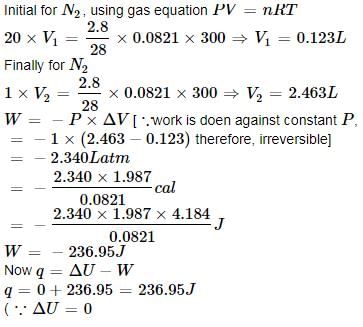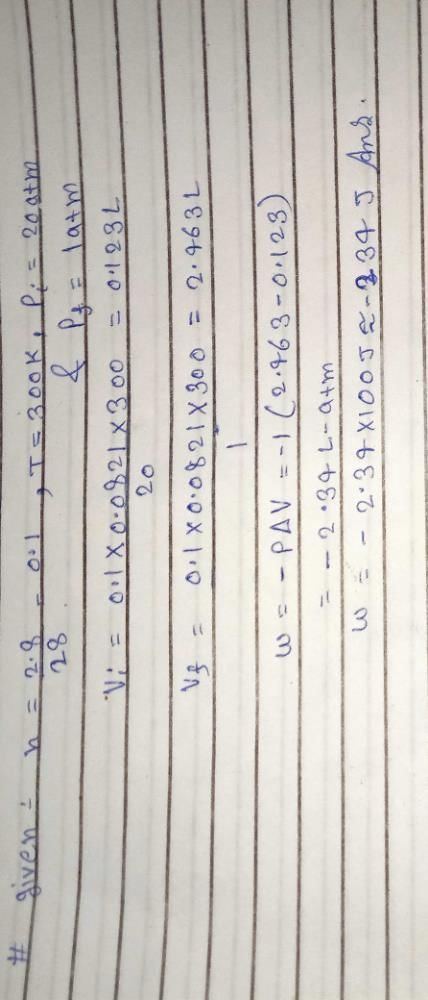JEE Exam > JEE Questions > 2.8g of N2 gas at 300k and 20 atm was allowed...
Start Learning for Free
2.8g of N2 gas at 300k and 20 atm was allowed to expand isothermally against a constant external pressure of 1 atm.calculate W for the gas?
Verified Answer
2.8g of N2 gas at 300k and 20 atm was allowed to expand isothermally a...

 This question is part of UPSC exam. View all JEE courses
This question is part of UPSC exam. View all JEE courses
Most Upvoted Answer
2.8g of N2 gas at 300k and 20 atm was allowed to expand isothermally a...

Community Answer
2.8g of N2 gas at 300k and 20 atm was allowed to expand isothermally a...
Given:
- Initial conditions:
- Volume of gas (V1) = ?
- Temperature (T) = 300 K
- Pressure (P1) = 20 atm
- Number of moles of gas (n) = ?
- Final conditions:
- External pressure (Pext) = 1 atm
To Find:
- Work done by the gas (W)
Formula:
The work done by a gas during an isothermal expansion can be calculated using the following formula:
W = -nRT ln(V2/V1)
where:
- W is the work done by the gas
- n is the number of moles of the gas
- R is the gas constant (8.314 J/(mol·K))
- T is the temperature in Kelvin
- V1 and V2 are the initial and final volumes of the gas, respectively.
Solution:
Step 1: Calculate the initial volume of the gas (V1)
To calculate the initial volume (V1), we can use the ideal gas law equation:
PV = nRT
Rearranging the equation, we get:
V1 = (nRT) / P1
Step 2: Calculate the final volume of the gas (V2)
Since the process is an isothermal expansion, the final temperature (T2) will also be 300 K. We can use the ideal gas law equation to calculate the final volume (V2):
V2 = (nRT) / Pext
Step 3: Calculate the work done by the gas (W)
Using the formula mentioned above:
W = -nRT ln(V2/V1)
Substituting the values:
W = -nRT ln((nRT/Pext) / (nRT/P1))
Simplifying the equation:
W = -nRT ln(P1/Pext)
Step 4: Calculate the number of moles of gas (n)
To calculate the number of moles (n), we can use the formula:
n = mass / molar mass
Given that the mass of N2 gas is 2.8 g and the molar mass of N2 is approximately 28 g/mol:
n = 2.8 g / 28 g/mol
n = 0.1 mol
Step 5: Calculate the work done by the gas (W)
Substituting the values:
W = - (0.1 mol) * (8.314 J/(mol·K)) * (300 K) * ln(20/1)
W = - 249.42 J ln(20)
Final Answer:
The work done by the gas is approximately -249.42 J ln(20).
- Initial conditions:
- Volume of gas (V1) = ?
- Temperature (T) = 300 K
- Pressure (P1) = 20 atm
- Number of moles of gas (n) = ?
- Final conditions:
- External pressure (Pext) = 1 atm
To Find:
- Work done by the gas (W)
Formula:
The work done by a gas during an isothermal expansion can be calculated using the following formula:
W = -nRT ln(V2/V1)
where:
- W is the work done by the gas
- n is the number of moles of the gas
- R is the gas constant (8.314 J/(mol·K))
- T is the temperature in Kelvin
- V1 and V2 are the initial and final volumes of the gas, respectively.
Solution:
Step 1: Calculate the initial volume of the gas (V1)
To calculate the initial volume (V1), we can use the ideal gas law equation:
PV = nRT
Rearranging the equation, we get:
V1 = (nRT) / P1
Step 2: Calculate the final volume of the gas (V2)
Since the process is an isothermal expansion, the final temperature (T2) will also be 300 K. We can use the ideal gas law equation to calculate the final volume (V2):
V2 = (nRT) / Pext
Step 3: Calculate the work done by the gas (W)
Using the formula mentioned above:
W = -nRT ln(V2/V1)
Substituting the values:
W = -nRT ln((nRT/Pext) / (nRT/P1))
Simplifying the equation:
W = -nRT ln(P1/Pext)
Step 4: Calculate the number of moles of gas (n)
To calculate the number of moles (n), we can use the formula:
n = mass / molar mass
Given that the mass of N2 gas is 2.8 g and the molar mass of N2 is approximately 28 g/mol:
n = 2.8 g / 28 g/mol
n = 0.1 mol
Step 5: Calculate the work done by the gas (W)
Substituting the values:
W = - (0.1 mol) * (8.314 J/(mol·K)) * (300 K) * ln(20/1)
W = - 249.42 J ln(20)
Final Answer:
The work done by the gas is approximately -249.42 J ln(20).

|
Explore Courses for JEE exam
|

|
Similar JEE Doubts
2.8g of N2 gas at 300k and 20 atm was allowed to expand isothermally against a constant external pressure of 1 atm.calculate W for the gas?
Question Description
2.8g of N2 gas at 300k and 20 atm was allowed to expand isothermally against a constant external pressure of 1 atm.calculate W for the gas? for JEE 2025 is part of JEE preparation. The Question and answers have been prepared according to the JEE exam syllabus. Information about 2.8g of N2 gas at 300k and 20 atm was allowed to expand isothermally against a constant external pressure of 1 atm.calculate W for the gas? covers all topics & solutions for JEE 2025 Exam. Find important definitions, questions, meanings, examples, exercises and tests below for 2.8g of N2 gas at 300k and 20 atm was allowed to expand isothermally against a constant external pressure of 1 atm.calculate W for the gas?.
2.8g of N2 gas at 300k and 20 atm was allowed to expand isothermally against a constant external pressure of 1 atm.calculate W for the gas? for JEE 2025 is part of JEE preparation. The Question and answers have been prepared according to the JEE exam syllabus. Information about 2.8g of N2 gas at 300k and 20 atm was allowed to expand isothermally against a constant external pressure of 1 atm.calculate W for the gas? covers all topics & solutions for JEE 2025 Exam. Find important definitions, questions, meanings, examples, exercises and tests below for 2.8g of N2 gas at 300k and 20 atm was allowed to expand isothermally against a constant external pressure of 1 atm.calculate W for the gas?.
Solutions for 2.8g of N2 gas at 300k and 20 atm was allowed to expand isothermally against a constant external pressure of 1 atm.calculate W for the gas? in English & in Hindi are available as part of our courses for JEE.
Download more important topics, notes, lectures and mock test series for JEE Exam by signing up for free.
Here you can find the meaning of 2.8g of N2 gas at 300k and 20 atm was allowed to expand isothermally against a constant external pressure of 1 atm.calculate W for the gas? defined & explained in the simplest way possible. Besides giving the explanation of
2.8g of N2 gas at 300k and 20 atm was allowed to expand isothermally against a constant external pressure of 1 atm.calculate W for the gas?, a detailed solution for 2.8g of N2 gas at 300k and 20 atm was allowed to expand isothermally against a constant external pressure of 1 atm.calculate W for the gas? has been provided alongside types of 2.8g of N2 gas at 300k and 20 atm was allowed to expand isothermally against a constant external pressure of 1 atm.calculate W for the gas? theory, EduRev gives you an
ample number of questions to practice 2.8g of N2 gas at 300k and 20 atm was allowed to expand isothermally against a constant external pressure of 1 atm.calculate W for the gas? tests, examples and also practice JEE tests.

|
Explore Courses for JEE exam
|

|
Signup for Free!
Signup to see your scores go up within 7 days! Learn & Practice with 1000+ FREE Notes, Videos & Tests.
























